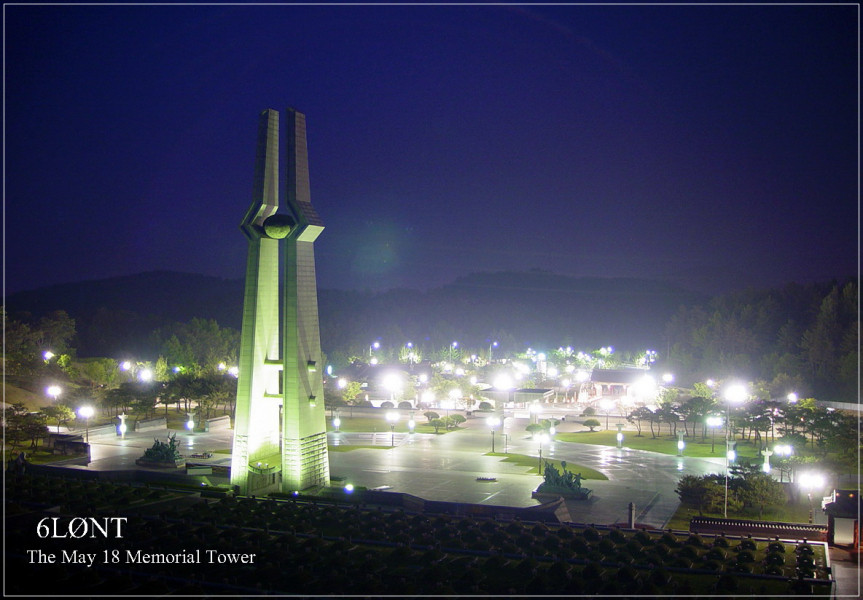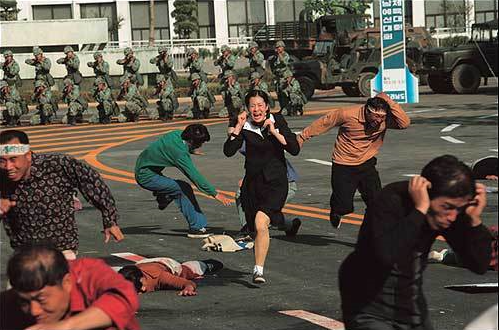Radio Amateurs from South Korea will be active with special call HL40GDM from Gwangju, South Korea, 1 - 31 May 2020, for The 40th Anniversary of The May 18 Democratic Uprising.
Team - HL4CCM, HL4CBI, HL4CEL, HL4CRO.
They will operate on HF Bands.
QSL via HL4CCM, ClubLog, eQSL, QRZ.com Log Book.
Ads for direct QSL:
Jae-Ho Kim, P.O.Box 127, Gwangju, 61470, South Korea.

Information from their qrz page:
The most tragic and disgraceful incident in modern Korean history took place in Gwangju in May 1980.
During the Uprising many citizens of Gwangju were killed by soldiers.
It started with the December 12, 1979 coup by Chun Doo-Hwan's military junta who occupied the Chonnam Provincial Hall with armed forces sent to Gwangju by the Martial Law Enforcement Headquarters. After the assassination of President Park Chung-hee, a group of politically minded soldiers undertook Operation Chungjung (Operation True Heart) to quell the Uprising in Gwangju. In this way, the Fifth Republic came into existence. The victims of The martial law force's brutality numbered 4,369 all told: 154 killed, 74 missing, 4,141 wounded (including those who died from their wounds). This data is based on the present condition of compensation related to The May 18 Uprising, as of November 31, 2006. Among the 7,173 requested cases, 5,060 were admitted. The number of people illegally taken into custody during the period of martial law was more than 3,000, and nobody knows how many people were unjustly arrested while they were demonstrating against martial law.
Recent history has proven that the Gwangju Democratic Uprising was a victory, not a defeat, and that the people who lost their lives in Gwangju did not give their lives in vain. Now they are our heroes. Although the Gwangju Democratic Uprising seemed to end in failure, that failure became an inspiration for the Democratic Consciousness that fueled opposition to the dictatorship of the 1980s. However, it was only after many twists and turns that the Gwangju Democratic Uprising was properly defined as a people's resistance, and not a riot. At the time, government authorities referred to the Uprising as the 'Gwangju Affair', a riot or rebellion backed by some seditious powerscheming to overthrow the government. In June 1987, however, people throughout the country slowly started to recognize the true nature of the Gwangju Uprising of May, 1980. In June 1988, with the advent of the Sixth Republic, the Uprising was renamed the Gwangju Democratization Movement in order to restore national harmony.
Additionally, during the 13th National Assembly, the change in the balance of political power made it possible to hold a hearing concerning the Gwangju Uprising. This hearing was televised all over the country, and it played an important role in spreading the truth of what had happened in Gwangju. It brought to light how brutally martial law forces had treated the citizens during those ten days in May. In 1993 on May 13th, with the start of a civilian government, President Kim Young-Sam made clear his position on the Gwangju Democratic Uprising in a speech: The bloodshed of Gwangju in May, 1980 is the cornerstone of this country's democracy. Its victims dedicated their lives to democracy. He continued by indicating the shift in perception that had taken place: This government today stands in line with the Gwangju Democratization Movement. In this announcement, he redeemed the Gwangju Democratic Uprising. Again, thanks to a drive to set history right, after that speech on May 13, the 5.18 Special Law was enacted. It is rated as a great contribution in bringing the military junta, which had cruelly trampled upon Gwangju, to trial, by upholding law, justice, and history and in healing the wounds that the nation had suffered in the past.
Contrary to this new perspective, however, the Supreme Court then ruled that the Gwangju Uprising was a peoples' rebellion and declared the people who took part in The Uprising to be a mob. So the Gwangju Democratic Uprising will remain a rebellion and the participants a mob, until there is a reversal of the ruling through retrial. The full truth of the Gwangju Democratic Uprising has yet to be disclosed. After the extension of martial law on May 17, 1980, several questions remain: (1) why were the martial law forces sent to Gwangju reinforced; (2) who acted as the leader of the army; and (3) who gave orders for the army to fire? We still do not know. Equally, we are still unsure about what role the United States military and government played in the decision process, and how many innocent citizens were killed. Even though most military officers have been strictly judged by law and history, the truth is that even now we are as much in the dark as ever. It is therefore our duty to set the matter straight.
In order to correctly establish the historical meaning of the Gwangju Democratic Uprising, we should evaluate its character.

Team - HL4CCM, HL4CBI, HL4CEL, HL4CRO.
They will operate on HF Bands.
QSL via HL4CCM, ClubLog, eQSL, QRZ.com Log Book.
Ads for direct QSL:
Jae-Ho Kim, P.O.Box 127, Gwangju, 61470, South Korea.

Information from their qrz page:
The most tragic and disgraceful incident in modern Korean history took place in Gwangju in May 1980.
During the Uprising many citizens of Gwangju were killed by soldiers.
It started with the December 12, 1979 coup by Chun Doo-Hwan's military junta who occupied the Chonnam Provincial Hall with armed forces sent to Gwangju by the Martial Law Enforcement Headquarters. After the assassination of President Park Chung-hee, a group of politically minded soldiers undertook Operation Chungjung (Operation True Heart) to quell the Uprising in Gwangju. In this way, the Fifth Republic came into existence. The victims of The martial law force's brutality numbered 4,369 all told: 154 killed, 74 missing, 4,141 wounded (including those who died from their wounds). This data is based on the present condition of compensation related to The May 18 Uprising, as of November 31, 2006. Among the 7,173 requested cases, 5,060 were admitted. The number of people illegally taken into custody during the period of martial law was more than 3,000, and nobody knows how many people were unjustly arrested while they were demonstrating against martial law.
Recent history has proven that the Gwangju Democratic Uprising was a victory, not a defeat, and that the people who lost their lives in Gwangju did not give their lives in vain. Now they are our heroes. Although the Gwangju Democratic Uprising seemed to end in failure, that failure became an inspiration for the Democratic Consciousness that fueled opposition to the dictatorship of the 1980s. However, it was only after many twists and turns that the Gwangju Democratic Uprising was properly defined as a people's resistance, and not a riot. At the time, government authorities referred to the Uprising as the 'Gwangju Affair', a riot or rebellion backed by some seditious powerscheming to overthrow the government. In June 1987, however, people throughout the country slowly started to recognize the true nature of the Gwangju Uprising of May, 1980. In June 1988, with the advent of the Sixth Republic, the Uprising was renamed the Gwangju Democratization Movement in order to restore national harmony.
Additionally, during the 13th National Assembly, the change in the balance of political power made it possible to hold a hearing concerning the Gwangju Uprising. This hearing was televised all over the country, and it played an important role in spreading the truth of what had happened in Gwangju. It brought to light how brutally martial law forces had treated the citizens during those ten days in May. In 1993 on May 13th, with the start of a civilian government, President Kim Young-Sam made clear his position on the Gwangju Democratic Uprising in a speech: The bloodshed of Gwangju in May, 1980 is the cornerstone of this country's democracy. Its victims dedicated their lives to democracy. He continued by indicating the shift in perception that had taken place: This government today stands in line with the Gwangju Democratization Movement. In this announcement, he redeemed the Gwangju Democratic Uprising. Again, thanks to a drive to set history right, after that speech on May 13, the 5.18 Special Law was enacted. It is rated as a great contribution in bringing the military junta, which had cruelly trampled upon Gwangju, to trial, by upholding law, justice, and history and in healing the wounds that the nation had suffered in the past.
Contrary to this new perspective, however, the Supreme Court then ruled that the Gwangju Uprising was a peoples' rebellion and declared the people who took part in The Uprising to be a mob. So the Gwangju Democratic Uprising will remain a rebellion and the participants a mob, until there is a reversal of the ruling through retrial. The full truth of the Gwangju Democratic Uprising has yet to be disclosed. After the extension of martial law on May 17, 1980, several questions remain: (1) why were the martial law forces sent to Gwangju reinforced; (2) who acted as the leader of the army; and (3) who gave orders for the army to fire? We still do not know. Equally, we are still unsure about what role the United States military and government played in the decision process, and how many innocent citizens were killed. Even though most military officers have been strictly judged by law and history, the truth is that even now we are as much in the dark as ever. It is therefore our duty to set the matter straight.
In order to correctly establish the historical meaning of the Gwangju Democratic Uprising, we should evaluate its character.

